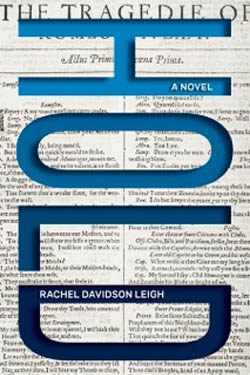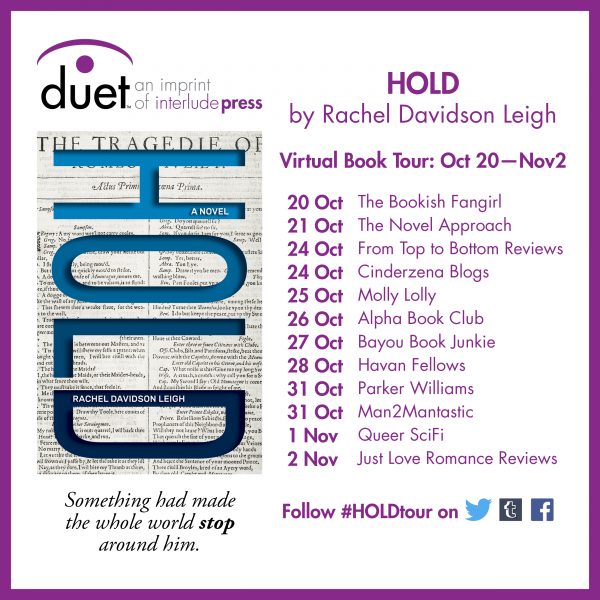 QSFer Rachel Davidson Leigh has a new YA sci fi book out:
QSFer Rachel Davidson Leigh has a new YA sci fi book out:
Luke Aday knew that his sister’s death was imminent—she had been under hospice care for months—but that didn’t make her death any easier on him or their family.
He returns to school three days after the funeral to a changed world; his best friends welcome him back with open arms, but it isn’t the same. When a charismatic new student, Eddie Sankawulo, tries to welcome Luke to his own school, something life-changing happens: In a moment of frustration, Luke runs into an empty classroom, hurls his backpack against the wall—and the backpack never lands.
Luke Aday has just discovered that he can stop time.
Today we’re happy to be interviewing Rachel Davidson Leigh, author of Hold:
Hi Rachel, thank you for agreeing to this interview. Tell us a little about yourself, your background, and your current book.
Hi! Thank you so much for having me on your blog! I’m Rachel, and my hobbies include overanalyzing television shows and pairing readers with their perfect books. My debut novel, Hold, is a story about grief, identity, and transformation. After his sister’s death, Lucas Aday can hardly drag himself back to school. He couldn’t possibly prepare himself to stop time or to fall for the only other boy who doesn’t stop moving.
1) Do you pay attention to literary criticism? If so, how do you handle it?
I write literary criticism, so yes and no. I love reading thoughtful, politically engaged criticism of literature. If stories are one the most important ways that we understand our world (and I’d argue that they are), then what could be more important than making sure that the most influential voices are doing it well? I respect the folks who step up and push the book industry to be responsible for the narratives they (and we) put into the world. That being said, I can’t always read what folks write about my own work. If I give it enough time, I always appreciate reviews. They’re necessary for readers and they make me a better writer, but sometimes it takes a little while to get over the insecurity and remember that criticizing me and criticizing my book are two very different things.
2) How do you come up with your titles?
Honestly, I don’t know, but they’re one of the first things I figure out when I’m planning a new project. My ideas usually begin with an image in the case of Hold, I saw the moment when Luke first stops time. It’s his first day back at school and he’s been turned emotionally inside out by everything that’s changed while he was gone, so he ducks into a classroom, throws his backpack against a wall, and the backpack never lands. I first saw that moment, when Luke’s bag hangs in the air above his head, and he runs his hand underneath it as if looking for invisible strings.
I had to figure out who this character was and what he wanted. When those pieces fell into place, I had my title, and I knew I was ready to start writing.
3) What new authors have grasped your interest?
I don’t know if any of these folks count as “new,” since they each have at least one book out. FT Lukens published The Star Host, a biscifi YA epic, earlier this year and the next book in the series is due out soon. I loved Patrice Lawrence’s Orangeboy, Wes Kennedy’s To Terminator With Love, and Julia Ember’s Unicorn Tracks. Plus, I am so excited about James Tynion IV and Rian Sygh, who are jointly responsible for The Backstagers. Get this. The comic is about a group of theater tech boys at a private school who discover a portal to another world backstage. Obviously, I needed it immediately.
4) What is the hardest part about writing?
Rough drafts have always been the worst. Once I have a disgustingly bad full draft, I love revising and rewriting. I could rearrange a scene forever, just playing with new ideas, but until I have something tangible to work with I have a hard time relaxing and just getting to know the characters. Once I have a full (and very rough) draft, I can settle in and let the actual story emerge.
5) Name your four most important food groups.
Can I name bread four times? Okay, but seriously, I love my carbs, so I’ll name that group once, but just put it in bold for extra emphasis. For the three others, I’ll say sushi, cake, and coffee. Coffee should really get a special section for service to this book, but then the bread might get jealous.
Giveaway
Buy Links
Excerpt
As he entered the junior commons, Luke almost stepped on a pair of shoes. The girl wearing them found her way around him and scowled under her breath as Luke leaned against the nearest wall. He was going to look teary-eyed and breakable no matter what. Along the edges he couldn’t do more damage, and that’s where he caught the flash of blue. It was on the wall next to the boy’s bathroom.
The poster, held up by Scotch tape, announced the theater department’s Spring Review in the same color and font they’d used when Luke was nine. Ten years from now they would probably still perform Shakespearian tragedies and Oklahoma. This year, they were doing 25th Annual Putnam County Spelling Bee, but he didn’t care about that. He cared about the names of the tech crew written across the bottom of the poster. That was their spot, his and Marcos Aldama’s and Dee’s. For a year and a half, since they’d been trusted to not to electrocute themselves, they’d run tech for every production this school had bothered to stage. Dee was supposed to be the stage manager, Marcos was supposed to be on sound and he was supposed to be on sets.
But he wasn’t there.
He found Dee’s and Marcos’s names right where they were supposed to be, and then there was a third name. He’d been replaced by Neil Vargassi. Vargassi? Luke had last heard that name when he’d found out that “that Vargassi kid” had fallen off the stage during warm ups and had had to be sent to the emergency room.
Luke read the poster three times with his hand pressed against the wall beside it. The wall wasn’t going anywhere. He wasn’t sure about anything else.
They wouldn’t—He read it again. But of course, they would. He’d been gone a month at the beginning of the spring semester with no explanation. Of course they would have found someone to take his place, and he’d had the easiest tech job in the world. He wasn’t irreplaceable, but he’d never thought—
He turned away from the poster and made himself move, as the sickness slid into his gut. It pooled in a sludge below his navel, like a toxic spill, and his body wanted it gone, but there were people going in and out of the bathroom. There were people everywhere.
Luke clasped his hand over his mouth. On his right, the door to a dark classroom sat ajar. He threw himself inside, grabbed the trashcan by the door and gagged until his eyes watered. Nothing came up. He couldn’t even make himself puke. He couldn’t do anything but make people feel sorry for him.
Luke crouched at the closed door with his back flat against the metal kick plate, and pressed his fingers against his temples until pain blossomed under his skin. His stomach turned.
I can’t make it stop, because I shouldn’t be here anymore.
He closed his eyes against the empty classroom, the dirty book jackets and the kick marks on the legs of the chairs.
I should be gone. It should have been me.
Luke pushed himself to his feet and tasted tears. His phone rang in his backpack again and again. He had to answer it because it could have been his mom, but his hands couldn’t remember how. He pulled at the zipper on the front of his bag, but it wouldn’t give. He couldn’t make it move. He tried again and, before he knew what he was doing, he hit it. He hit the bag over and over again until it crunched under his fists. He punched grooves into the plastic lining and ripped holes in the straps.
The holes were real. He made them. The fabric tore under his hands. He made that happen. But the phone wouldn’t stop ringing—four, five, six—and, as he gasped for air, he lifted the backpack and heaved it across the room like a grenade.
Luke turned away, closed his eyes and waited for it to smash against the far wall. He waited and listened for the crunch and the snap, but it never came. His bag never hit the floor.
Author Bio
Rachel Davidson Leigh is a teacher, a writer and an avid fan of young adult LGBTQ ction. Her hobbies include overanalyzing television shows and playing matchmaker with book recommendations. Currently, she lives in Wisconsin with her family and two neurotic little dogs. Hold is her debut novel. Her short story “Beautiful Monsters” was featured in Summer Love, a collection of short stories published by Duet Books, the young adult imprint of Interlude Press.



